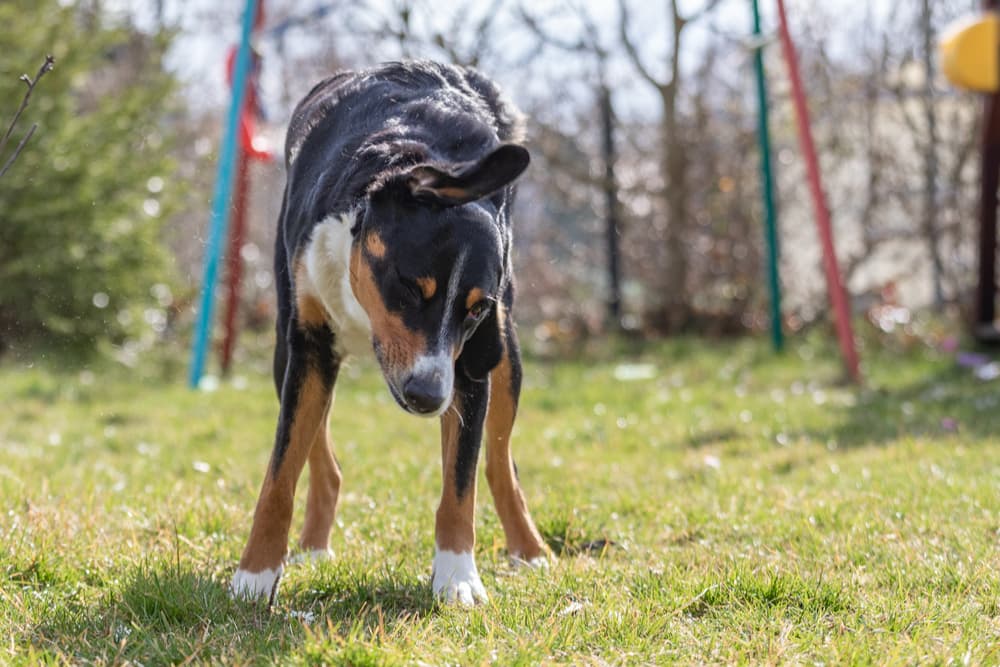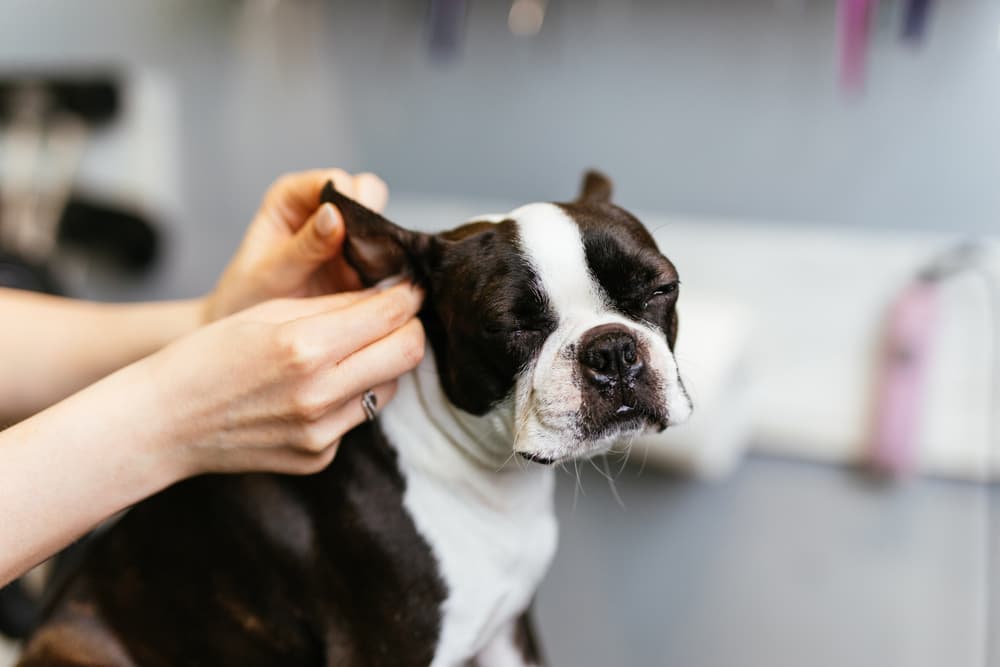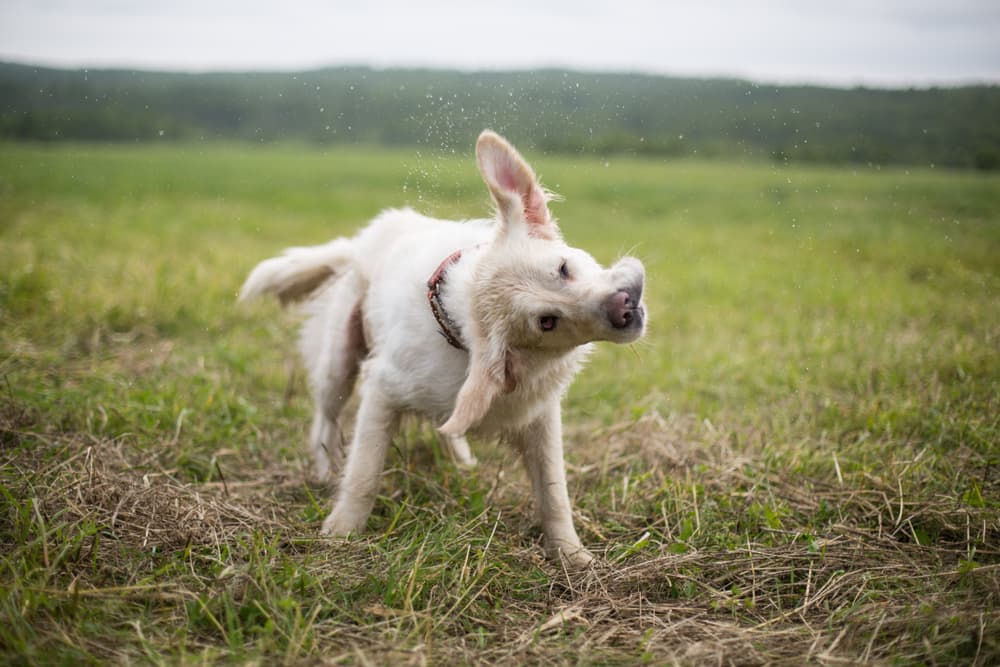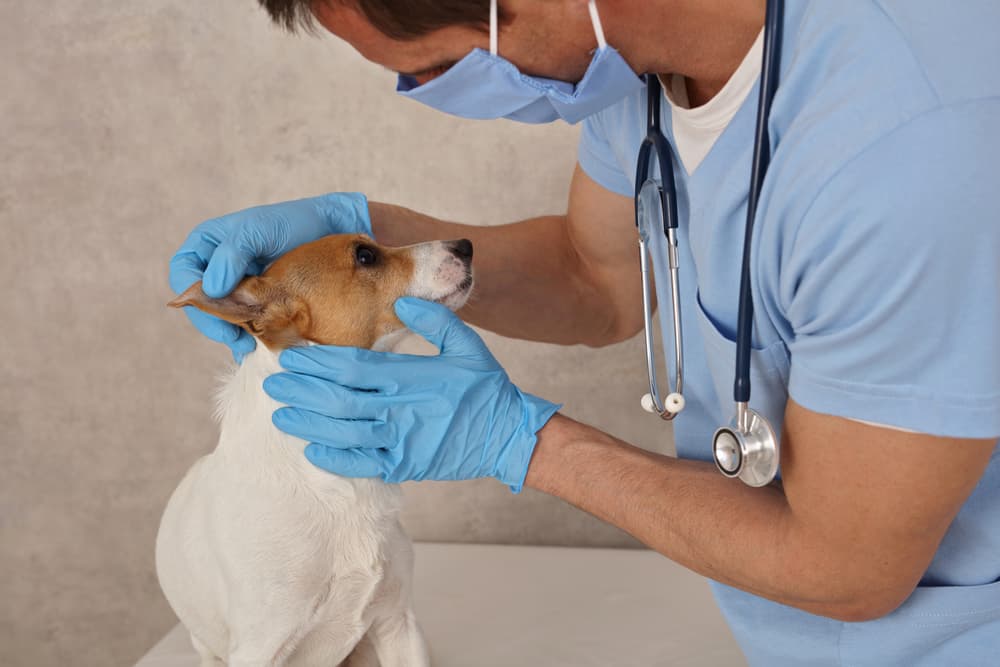Why Do Dogs Shake Their Heads?

You’re lying in bed after a long day at work, trying to fall asleep. Just as you start to drift off, you’re startled awake by the jingling of collar tags as your dog shakes his head. After shaking for a few seconds, your dog finally settles down, and so do you… until the next round of head shaking starts up again.
This pattern repeats again and again, every few minutes. As the night wears on, your annoyance turns to concern and you begin to worry about what could be causing this behavior.
Read on to learn more about why dogs shake their heads, and what you can do to help.
Why Do Dogs Shake Their Heads?

Dogs shake their heads for a variety of reasons, and it isn’t always an abnormal behavior. In some contexts, head shaking is completely predictable and expected. Many dogs shake their heads when they first wake up, just like we tend to stretch when we get out of bed.
Dogs also tend to shake their heads when they’re playing with a toy or excited. Some dogs even do a full-body shake, starting at the head and extending all the way along the body to the tail. They might also shake their heads if they get wet from a bath or from swimming. An occasional shake of the head is nothing to be concerned about.
Excessive head shaking, however, often has an underlying medical cause. If your dog is repeatedly and frequently shaking their head, especially if this is a change from their normal behavior, it’s important to determine the cause of their abnormal head shaking.
Why Does My Dog Keep Shaking His Head? 5 Potential Reasons

The most common cause of abnormal head shaking in dogs is inflammation of the ears, called otitis. There are several potential causes of otitis, each of which differ in their treatment and long-term management. Let’s explore them further.
Ear Infection

Ear infections are a relatively common problem in dogs. They occur when bacteria or yeast (which are always present in the environment) proliferate to an excessive level within the ear canal. Infection can occur in the inner, middle, or external ear canal, although infections of the external ear canal (otitis externa) are the most common in dogs. Factors that may predispose a dog to develop otitis externa include excessive moisture in the ear canal, allergies, and endocrine disease (such as hypothyroidism).
Ear Mites

Ear mites can cause inflammation of the ears, but they are actually relatively uncommon in adult dogs. They are more common in puppies, especially those housed in a crowded situation that promotes close contact with other dogs. Ear mites are microscopic parasites that live within the ear canal, causing severe irritation and discomfort for affected dogs.
Foreign Body

Foreign objects, such as grass seeds, occasionally find their way into a dog’s ear canal. If this occurs, they may cause significant irritation and inflammation, causing a dog to shake their head and show other signs of discomfort.
Ear Trauma

Any wound to the ear can cause irritation and head shaking. Trauma can have an external source (such as a bite wound from another dog), or it may be caused by self-trauma (a dog that scratches their ear and causes an injury with their toenail).
Allergic Otitis

If a dog is shaking their head with no ear infection or other visible abnormalities, allergies may be to blame. Many dogs are allergic to inhaled allergens, such as tree pollen, weeds, grasses, mold, etc. Other dogs are allergic to proteins within their food, such as beef or chicken. Both types of allergies can lead to inflammation within the ear canals.
Other Causes of Dog Head Shaking

While ear infections, ear mites, foreign bodies, ear trauma, and allergic otitis are certainly the most common causes of head shaking in dogs, there can be other causes.
Any disease that affects the ear, including rare autoimmune disorders and generalized skin issues, can lead to shaking of the head.
In rare cases, your dog’s head shaking may even have a cause other than ear or skin disease. Determining the cause of your dog’s head shaking requires a thorough veterinary workup.
What to Do if Your Dog Keeps Shaking His Head

A new onset of persistent head shaking in a dog should prompt a visit to the veterinarian. You don’t necessarily need to rush to the emergency veterinarian right away, because a single episode of head shaking could have a mild cause (like an insect bite). If the head shaking persists, however, you will want to have your dog examined within the next one to two days.
A dog that shakes their head forcefully and for a prolonged period of time can actually damage their ear. Blood vessels in the ear can burst, filling the pinna (ear flap) with blood and resulting in a condition called an aural hematoma (ear hematoma), which is a blood blister. The pinnae can also become damaged by the force with which they hit your dog’s head and neck, leading to scabs and wounds on the ears.
If your dog’s head shaking is caused by an ear infection, early treatment is more effective and will lead to more rapid resolution. Delaying treatment will not only prolong your dog’s discomfort, it could also make your dog’s ear infection more challenging and expensive to treat.
Dog Shaking Head: Diagnosis and Treatment

Your veterinarian will likely begin by performing a thorough physical exam, looking for any other signs of illness or disease. Next, your veterinarian will focus on your dog’s ears. They will thoroughly examine your dog’s pinnae (external ear flaps), looking for wounds, inflammation, and other abnormalities. Next, they will perform an otoscopic exam, in which an otoscope (an instrument designed to permit evaluation of the ear canal) is used to provide a magnified view of your dog’s ear canals and ear drum. The otoscopic exam will allow your veterinarian to look for inflammation of the ear canals, debris in the ear canals, and any abnormalities associated with the eardrum.
If your veterinarian sees any evidence of otitis or otherwise suspects a condition affecting your dog’s ears, an ear cytology will likely be recommended. This test involves removing a small sample of debris from the ear canal with a cotton swab, and then examining that debris under the microscope. An ear cytology can tell your veterinarian whether your dog has ear mites, a bacterial infection, or a yeast infection within the ears. If inflammatory cells are found in the absence of an infection, this can suggest the presence of allergic inflammation.

Once your veterinarian has determined the cause of your dog’s ear inflammation, treatment will be prescribed. Most ear infections are treated with prescription ear cleaners and topical medications. Oral medications may also be prescribed, especially in dogs with underlying allergies.
Some topical medications are applied by a veterinarian in the veterinary clinic. This alleviates the hassle of you having you medicate your dog’s ears at home, but requires you to return for follow-up treatments every one to two weeks until the infection has resolved. Other treatments are designed to be administered by a dog’s owner at home, once or twice daily. Your veterinarian will talk to about which treatment is best for your dog, and give you instructions for completing your dog’s course of treatment. If necessary, a veterinary technician may demonstrate how to clean and medicate your dog’s ears. A recheck appointment will likely be scheduled, so your veterinarian can ensure that the infection has resolved.
If your dog’s otoscopic exam and ear cytology do not show any evidence of otitis, your veterinarian will talk to you about further recommended testing to determine the cause of your dog’s head shaking.
Related Conditions
- Otitis externa
- Ear mites
- Aural/ear hematoma









